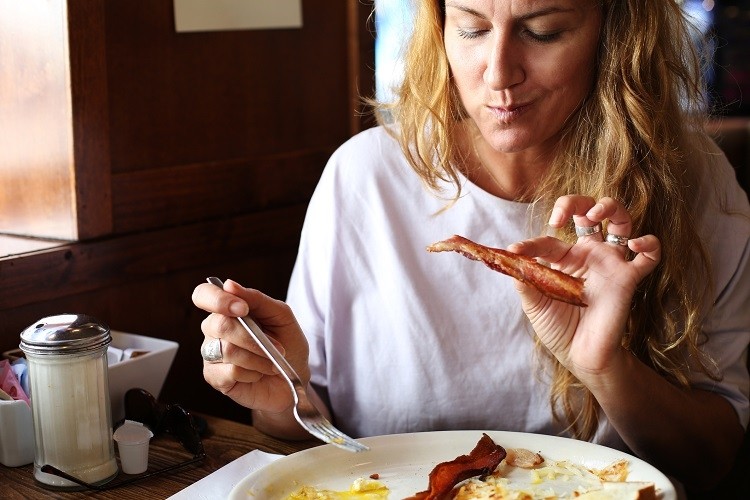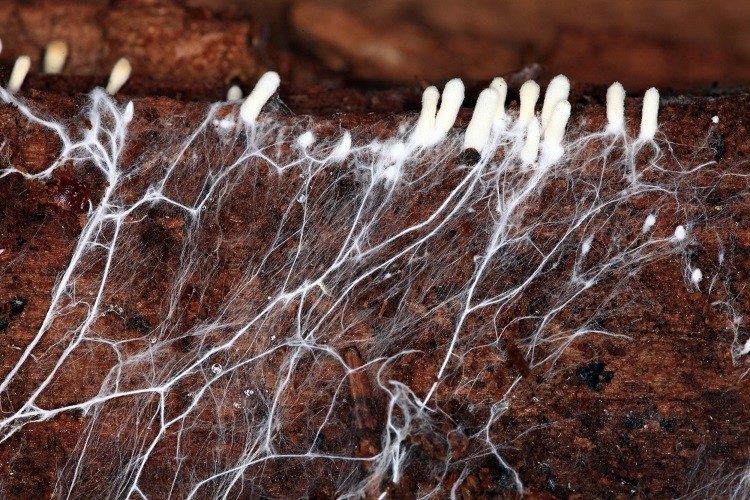Edible fungi have been consumed by people for millennia, usually unknowingly in merchandise similar to leavened bread and fermented juice.
Whereas fungi proceed to be a mainstay in bakery and beverage manufacturing, it additionally has potential within the realm of different protein. An inflow of entrepreneurs is popping to fungi – and extra particularly mycelia: the root-like construction from which fungi develop – to provide sustainable options to meat.
But in Europe, only a few mycelium-based various protein merchandise exist available on the market. The massive exception is Quorn Meals’ mycoprotein, derived from the mycelium of Fusarium venenatum, which first launched in 1985.
Why are new mycelium-based meals merchandise but to enter the market? Which main hurdles are standing in the way in which of commercialisation, and the way can they be overcome?
Mycelia is fungi proper… so why a novel meals?
Underneath EU laws, any meals that was not consumed ‘considerably’ previous to Might 1997 is taken into account a novel meals and requires pre-market authorisation.
These guidelines are in place to assist guarantee client security, defined Dr Martin Rühl, who heads up the working group on biochemical and molecular organic meals analytics and biotechnology on the College of Giessen, Germany.
“Nothing might be bought or consumed that may be poisonous,” he elaborated on the Future Meals Sequence: Mycelium occasion co-hosted by ProVeg Incubator and Zintinus.
Nevertheless, Dr Rühl is uncertain mycelia is dangerous to people. Most, or certainly all firms, are working with fungi. “Edible fungi have been consumed for lots of of years, and I believe the chance is both very low, or non-existent.”
Backing up his declare is analysis into the nutrient properties of the ‘fruiting our bodies’ of mushrooms – the half we buy in supermarkets – and vegetative mycelium. The variations, he careworn, are nominal.
Germany- and US-based Bosque Meals (previously Kinoko Labs) has undertaken analysis to find out whether or not each sort of mycelium in Europe will probably be thought-about a novel meals from a regulatory perspective.
Findings counsel that until a mycelia pressure is already authorized, it will likely be thought-about novel. These weren’t the outcomes Bosque Meals founder and CEO Isabella Iglesias-Musachio hoped for.
“I don’t suppose it ought to be thought-about novel,” she informed the Future Meals Sequence occasion. “I believe there’s sufficient proof to say there aren’t any toxicity points. The composition is [only slightly different] to fruiting our bodies…”
The priority for the European Fee, prompt Iglesias-Musachio, lies within the manufacturing technique for these mycelia strains. “Even when an ingredient is comparable [to an approved ingredient], if the way in which it’s produced is completely different….it’s thought-about novel.”
If it is a novel meals, what’s your Plan B?
The query mark stays whether or not the Fee will decide mycelia a novel meals or not.
Daniel MacGowan von Holstein, who co-founded Eager 4 Greens in 2019, has by no means thought-about mycelium a novel meals. From a genetic perspective, there’s ‘mainly no distinction’ between the fruiting physique and mycelium of fungi, he informed delegates.
“Our argument has at all times been that there it shouldn’t fall underneath Novel Meals [regulation].”
Nevertheless, given the uncertainty, the German start-up has established a ‘Plan B’. “We’re within the strategy of constructing an enormous manufacturing facility in Hamburg and don’t need to discover out subsequent yr that we are able to’t promote [our product] as a result of it’s a Novel Meals.”
Eager 4 Greens desires to finally promote its mycelium ingredient – which it grows over a 5–7-day interval leveraging submerged fermentation know-how – to makers of plant-based meat options.
The corporate’s Plan B is to promote its ingredient to pet good firms – the pet meals market has much less stringent laws in comparison with meals. And its Plan C, MacGowan von Holstein defined, is to provide its mycelium throughout the pond, the place novel mycelium-based merchandise are already available on the market, for US-based producers.
“We’re additionally Novel Meals utility within the EU, however on the identical time I don’t suppose that’s ought to be a Novel Meals.”
Barcelona-based Libre Meals can be getting inventive with methods to enter the market faster than Novel Meals regulation would possibly in any other case enable.
Actually, Libre Meals plans to launch its first product – the ‘first ever’ mushroom-based bacon – in November of this yr. For this product, Libre Meals is working with the fruiting our bodies of mushrooms, fairly than mycelia.
“We don’t face [the Novel Foods] problem with our bacon…we’re working with fruiting our bodies of mushrooms – that are already authorized within the EU – to have the ability to get onto the market…whereas we proceed to develop our [mycelia-based] know-how within the background,” defined CEO Alon Ramos.
Scaling submerged fermentation know-how
One other key problem for mycelium innovators lies in attaining scale.
How start-ups overcome this hurdle largely relies on their fermentation strategy, the commonest of which is submerged fermentation know-how. By submerging substrate in liquid, oxygen publicity is prevented, and anaerobic progress of mycelia is promoted.
As soon as an optimised medium is obtained, which incorporates making certain optimum pH ranges, start-ups will work to upscale. At this level, shear stress can turn into a problem. Shear stress is developed because of the velocity gradients throughout the fluid circulate and has the potential to noticeably have an effect on mycelium progress and mycelial differentiation. Potential options embody switching propeller sort and enjoying with completely different speeds, prompt Dr Rühl. “That will have a fantastic affect.”
One other vital issue is oxygen availability. Some manufacturing processes require extra oxygen than others, and the professor explains this can be a key consideration when growing scale.
In Germany, Eager 4 Greens is working with submerged fermentation know-how. However whereas others within the area are hoping to scale up into 50,000L and even 100,000L tanks, Eager 4 Greens is taking a unique strategy: the start-up is constructing ‘bioreactor farms’ with smaller volumes.
“Our plan is to have a manufacturing facility of round 30-40 1,000L tanks, having the ability to produce round 30,000-40,000L per week,” stated MacGowan von Holstein.
The benefit is no less than two-fold. Firstly, as mycelium attaches itself to ‘every little thing’ – together with the partitions and completely different elements throughout the bioreactor – it requires intensive cleansing, which will increase downtime. “The benefit we see with small [tanks] is that they will go into [a type of] dishwasher and go straight again into manufacturing. Our turnaround time could be very fast.”
The opposite win lies in containing any potential contamination danger to smaller vessels.
“We’re within the strategy of scaling,” continued the co-founder. “We could have the partitions of our manufacturing facility standing by the tip of the yr, and can possible begin manufacturing of our 30,000-400,000L capability by Q2 subsequent yr.”
Scaling solid-state fermentation know-how
The solid-state fermentation strategy is the lesser recognized of the 2. Oxygen can be a related issue, and the thickness of the substrate is a consideration when making certain provide to its ‘interior elements’, defined College of Giessen’s Dr Rühl.
“Most often, it’s important to hold a flat substrate, to permit for oxygen [supply],” he added, suggesting added implications for upscaling.
Bosque Meals’ Iglesias-Musachio, who’s utilizing this strategy to develop mycelium-based complete cuts, agreed there are challenges for solid-state that don’t essentially apply for submerged fermentation know-how.
“The problem for solid-state is that there’s not…a plug and play resolution. In the present day, there aren’t any contract manufacturing organisations (CMOs) for commercially scalable manufacturing of strong mycelium.
“That could be a massive problem, as a result of it’s important to…crack the code for the way you’re going to develop your individual sort of facility.”
Bosque Meals’ technique is to look to adjoining industries with confirmed success in scaling solid-state fermentation merchandise, and ‘piggyback’ on their options. This may increasingly assist deal with one other problem by way of price: Bosque Meals wants to pick out scalable options that, with economies of scale, will enable its merchandise to compete with the costs of animal meat.
“The benefit of our strategy is that we are able to work with present manufacturing methods…It does take time and a deep stage of experience inside our workforce to have the ability to retrofit a course of to that new sort of kit, but when you’ll be able to do it, [it can prove a] less expensive means.”
In retrofitting present know-how, the start-up can be leapfrogging one other hurdle within the fermentation sector. A significant problem lies in industrial fermentation capability, because of the inflow of entrepreneurs getting into the fermentation area – whether or not that be in mycelium manufacturing or precision fermentation-derived compounds. “There may be positively not sufficient capability for all of them to scale, which suggests they are going to possible have to construct their very own manufacturing amenities, construct their very own bioreactors, and that’s extremely costly.”
Bosque Meals has recognized ‘a couple of’ potential websites for manufacturing, with plans to begin producing inside a yr. “That may enable us to get to a semi-industrial stage,” she defined.
When will we be consuming novel mycelium-based merchandise?
As soon as regulatory and scalability hurdles have been overcome, novel mycelium-based merchandise will attain European plates. However when will that be?
Eager 4 Greens’ MacGowan von Holstein is hopeful new mycelium-based merchandise will attain the market ‘very quickly’: as early as late 2022/early 2023.
Hamburg-based Mushlabs, which is leveraging submerged fermentation to provide mycelium components for the B2B market, and completed merchandise for B2C, is already in its commercialisation section. “We’re…finalising the upscaling of our manufacturing processes to an industrial stage, establishing partnerships with main firms in Europe, the USA and Asia and getting ready to announce the launch of our first product,” co-founder and CEO Mazen Rizk informed FoodNavigator earlier this yr. This yr, 2022, is ‘all about commercialisation’, he added.
If new mycelium-based merchandise can enter the market that rapidly, it will likely be ‘nice’ information for the ‘complete mycelium outfit’, stated MacGowan von Holstein.

In keeping with Libre Meals’ Ramos, a ‘best-case state of affairs’ would see new mycelium-based merchandise enter the market throughout the subsequent 3-5 years. The beginning-up has ‘each curiosity’ in increasing to Latin America as effectively, which might additionally see Libre Meals edge nearer to the ‘very profitable’ US market. “We intention to make plans round that round 2025.”
It’s ‘exhausting to inform’ when new mycelium-based merchandise will hit the market, responded Bosque Meals’ Iglesias-Musachio, however the founder and CEO is estimating between 2-5 years in a ‘best-case state of affairs’.
“It may even be 18 months, however that might be from the purpose of submission of your file. So I’d say between 2-5 [years] when you’re being lifelike.”
It’s additionally region-dependent, she careworn. Bosque Meals is working with regulatory consultants in several areas to guage regulatory environments. Within the US, it’d take between 12-15 months, whereas in Europe it will possibly take anyplace from 22 months-onwards, she defined. “That may turn into for much longer, relying on the checks the European Meals Security Authority (EFSA) requires you to carry out with a view to certain the security of the product.”
Iglesias-Musachio hopes that down the road, different firms will ‘have it simpler’. “Proper now, particularly in Europe, it’s positively difficult for firms which are attempting to create higher options with a sustainable benefit, however we now have to pave the way in which for others to return.”
Study extra about how Bosque Meals, Eager 4 Greens, and Libre Meals are ‘unlocking the potential of the fungi kingdom’ with mycelia HERE.




